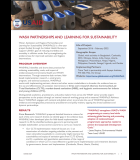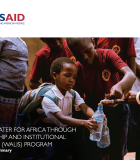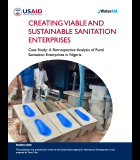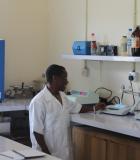Targeted States High Impact Project (TSHIP)
Nigeria accounts for only two percent of the world’s population, but contributes about 10% of global infant, child, and maternal mortality. Every year, about one million children who are under five years old die and some 33,000 women die of pregnancyrelated conditions—most of which are preventable deaths. Nigeria has been grouped among the 68 countries that are unlikely to attain the Millennium Development Goals Four and Five (MDGs) on child and maternal survival by 2015. In nearly every area of primary healthcare, there is low coverage of high impact interventions. Coverage tends to be substantially lower in the North East and North West zones of the country where TSHIP is implemented.
TSHIP was a project which supported the integration of primary healthcare services to deliver maternal, newborn, and child health (MNCH) interventions and strengthen the health systems in Bauchi and Sokoto States. TSHIP supported USAID/Nigeria’s former Strategic Objective 13 (now Development Objective 4): Increased use of social sector services. TSHIP’s principle objective was to foster the use of high-impact interventions in the two focus states. TSHIP is an integrated package of health service improvement interventions, which helps state and local governments improve primary healthcare services by filling in capacity gaps, building on institutional strengths, and improving households’ ability to protect and promote their own health.
Activity Description
TSHIP supported USAID/Nigeria’s former Strategic Objective 13 (now Development Objective 4): Increased use of social sector services. Its principle objective was to foster the use of high-impact interventions in the two focus states. Program activities were organized under four sub-objectives.
- State and local government capacity to deliver and promote use of high-impact MCH/FP/RH interventions strengthened.
- Delivery and promotion of high-impact FP/RH/MCH interventions at PHC strengthened and essential referral levels established.
- Strengthened roles of households and communities in promotion, practice, and delivery of high-impact MCH/FP/RH interventions.
- Policies, programming, and resource allocation at state and federal levels improved.
TSHIP put maximum effort into training and capacity building. The scale of these efforts is impressive. Training CBHVs meant training ten CBHVs per ward across 323 wards, or 3,230 people. In the area of capacity building, TSHIP also created job aids; conducted extensive pre-service training; trained on and implemented StandardsBased Management and Recognition (SBMR); and provided on-the-job training, crossvisits, and workshops. TSHIP supported a wide range of policies, from simple standard operating procedures (SOPs) to legislation that created new agencies, such as the Drugs and Medical Consumables Management Agency (DMMA) in Bauchi State. All of these efforts were designed to strengthen and improve health systems or the context surrounding these systems.
Expected Outcomes
- Strong and durable bonds between community institutions and the healthcare delivery system would exist in every ward of Bauchi and Sokoto States, with measurably improved household practices and increased use of services.
- Bauchi and Sokoto would have improved health systems and higher quality service delivery for family planning (FP), antenatal care (ANC), complicated pregnancy, emergency obstetrics and newborn care (EmONC), routine immunization (RI), Vitamin A, and child health.
Actual Outcomes
- A decrease from 25% in 2008 to less than 1% in 2013 in the percentage of women in Sokoto State who deliver alone.
- An increase from 17% in 2011 to 68% in 2014 in the percentage of children under 1-year old issued a birth certificate in Sokoto.
- Between 2010 and 2014, a 392% increase in the number of pregnant women receiving active management of the third stage of labor.
- Between 2010 and 2014, a 172% increase in the number of deliveries with a skilled birth attendant.
- 273,758 newborns received essential newborn care.
- More than 9,400 people trained in maternal/newborn health.
- 1,121,896 children less than 1-year of age received DPT3.
- 1,409,880 cases of malaria in children treated with ACT.
- 153 health facilities rehabilitated.
- More than 300 policies, action plans, guidelines, and protocols were developed or adapted to support improved MNCH and FP/RH services.
- The proportion of active ward development committees increased from 36% to 95%.





